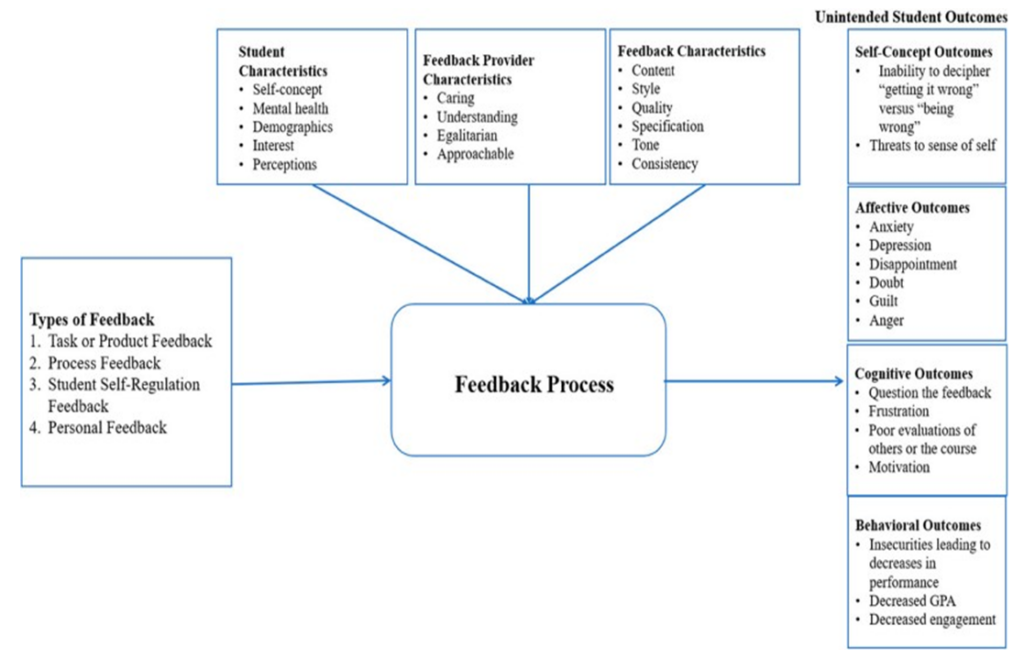Effects of negative feedback on self-image, emotions, cognitions, and behavior of bachelor students
Canadian researchers Marlee Mercer and Duygu Biricik Gulseren investigated the potentially harmful consequences of negative feedback aimed at undergraduate students (Mercer & Gulseren, 2023). Performance feedback is essential in higher education, especially to support students in their learning process. Giving negative feedback can also be necessary and useful. However, negative feedback can be unintentionally harmful, especially when it is more general than constructive criticism and does not target specific behaviors.
The literature review
The research focused on undergraduate students. During their bachelor's degree, students go through major academic, social, and psychological developments. Given the increasing mental health problems among students, the role of feedback is crucial. In modern views, feedback is seen as a two-way process, with the student as an active participant.
Mercer & Gulseren's research focused specifically on the unintended effects of negative feedback. They left out studies that only looked at the positive results of feedback. There remained 36 articles that were relevant.
Impact of negative feedback
Negative feedback can have several direct and indirect consequences for students. Below you can read about the effects of negative feedback on how students felt about themselves, their emotions, their cognitions, and their behaviors:
► Self-concept and self-efficacy
Eleven studies found that negative feedback can threaten students' self-concept and self-efficacy. Kim and Lee (2019) showed that students who received negative feedback had a more accurate self-assessment but significantly less self-efficacy. Instead of viewing the feedback as constructive, it can make students feel like they're not good enough. As one participant in Busse's (2013) study noted, the feedback can be so overwhelmingly negative that students question their own worth.
► Emotional reactions
Negative feedback can lead to various emotional reactions. Ayduk et al. (2013) and Kim and Lee (2019) found that negative feedback produced significantly more negative emotions. Anxiety was particularly frequently mentioned, as shown by five studies. After receiving negative feedback on their first university assignment, many students experienced heightened anxiety. Other emotional responses included shame, disappointment, confusion, doubt, frustration, sadness, guilt, dissatisfaction, and anger.
► Cognitive reactions
Several studies have identified negative cognitive effects after receiving negative feedback. Some students questioned the validity or usefulness of the feedback, resulting in reduced engagement with the feedback and ignoring the recommendations. Negative feedback also led to a decrease in confidence in teachers or the course as a whole. In terms of motivation, the findings were mixed; while some studies noted an increase in motivation after negative feedback, other studies found the opposite.
► Behavior change
Twelve studies identified negative behavioral changes after receiving negative feedback. Plakht et al. (2013) found no association between negative feedback and students' performance or contributions. Other studies showed that student behavior deteriorated after receiving negative feedback. For example, Yu et al. (2021) noted that feedback did not lead to improvement, but rather to more problems while revising texts. Brown, Peterson, and Yao (2016) found that negative feedback was negatively associated with average grades and student performance. It has also been found that feedback can lead to a decrease in engagement and commitment to future endeavors.
These findings emphasize the importance for teachers to be aware of the potential negative impact of feedback and to find methods that support students in a constructive way.
Factors that increase the negative effects
The effects of negative feedback depend on some contextual factors. Below, you can read how characteristics of the feedback provider, the feedback itself, the feedback receiver, and demographic factors can play a role.
► Feedback Provider:
- Inequity and detachment: Studies have shown that when a teacher is indifferent or distances himself from the student's feelings, this negatively impacts the value students place on the task and the feedback (Fong et al., 2018; Hill et al., 2021). A quote from 2021 illustrates this sentiment: "Teachers need to help us with the emotions related to assessment. It's about judgment, and teachers need to be both kind and fair in how they assess you."
- Incomprehension: Students sometimes feel that teachers do not understand their needs or are not on the same wavelength (Carless, 2020).
- Power imbalance: Especially in online education, there can be a sense of power imbalance, which makes students feel uncomfortable approaching their teachers with concerns (Small and Attree, 2016).
► Characteristics of the feedback:
- Content and Specificity: Students have criticized feedback that was not transparent, specific, or too detailed, or that focused on minor aspects of their work, such as grammatical errors (Busse 2013; Yu et al., 2021).
- Format and timing : Written feedback is sometimes perceived as more difficult to receive, especially for academically weaker students. End-of-semester feedback can feel useless if it cannot be used to improve their grades (Hill & West. 2022; Carless. 2020).
- Tone : The tone of the feedback can also have an effect on how students receive it. Negative beliefs about tone were sometimes associated with negative emotional responses (Lim et al., 2021).
► Receiver Features:
- Self-concept: Pre-existing levels of self-concept determine how a student would respond to negative feedback. For example, students with a more negative self-image had lower blood pressure reactivity and less facial negativity after negative feedback (Ayduk et al., 2013).
- Self-efficacy: A higher feedback self-efficacy can reduce the negative effect of grief caused by negative feedback (Motro, Comer, & Lenaghan, 2021).
- Self-esteem and self-image: If students feel insecure about whether they "belong" at a university, negative feedback can make them more susceptible to drop-out considerations (Shields, 2015).
- Fixed Mindset vs. Growth Mindset: Students who believe their intelligence is fixed (a fixed mindset) respond more defensively to negative feedback and are less likely to challenge themselves than students with a growth mindset (Forsythe & Johnson, 2017).
- Goals and motivations: Students' goals and motivations can influence how they respond to feedback (Lee, 2019; Motro, Comer, & Lenaghan, 2021).
- Mental health: pre-existing conditions such as anxiety and depression can influence students' responses to negative feedback (Tobias & Ito, 2021).
► Demographic differences:
- Culture: Cultural differences can influence how students respond to both success and failure (Shu & Lam, 2016).
- Race and gender: Differences have been noted in how different races and genders respond to negative feedback, particularly in terms of motivation and goal pursuit (Biernat & Danaher, 2012; Eddington & Foxworth, 2012). [CV: The authors, like many, use the term 'race, which I find an unfortunate term; read more.]
This comprehensive discussion provides an in-depth understanding of the factors that can increase the negative effects of feedback, based on various studies and research findings.
An integrated model
Based on research results, Mercer & Gulseren introduce an integrated model that highlights the dynamics of feedback and its negative impact on students in an academic context. The model defines four types of feedback: task, process, self-regulation, and personal, each of which has an effect on student outcomes such as self-concept, emotions, cognition, and behavior. For example, negative feedback can lead to reduced self-confidence or emotional reactions such as fear. Factors such as student characteristics and feedback characteristics play a role in how feedback is perceived and interpreted. The model provides insight into the nuances of negative feedback dynamics in education.
Implications for practice
The results of this research are important for teachers. While the authors do not advise avoiding negative feedback completely, they do draw attention to its possible unintended negative effects. They underline the importance of a supportive and constructive approach when providing feedback.
When teachers prepare to provide feedback, they should think carefully about the potential impact of their words and approach. By being aware of this impact, they can provide their feedback in a well-considered manner. Even if it is necessary to make critical comments, teachers should do so in a positive and helpful manner. They can point out areas for improvement, but the way they communicate should always be encouraging and supportive.
Although this study mainly focused on undergraduate education, the findings may also be relevant for other levels of education. This is because effective feedback is a universal aspect of education, independent of the specific level or context.


Comments